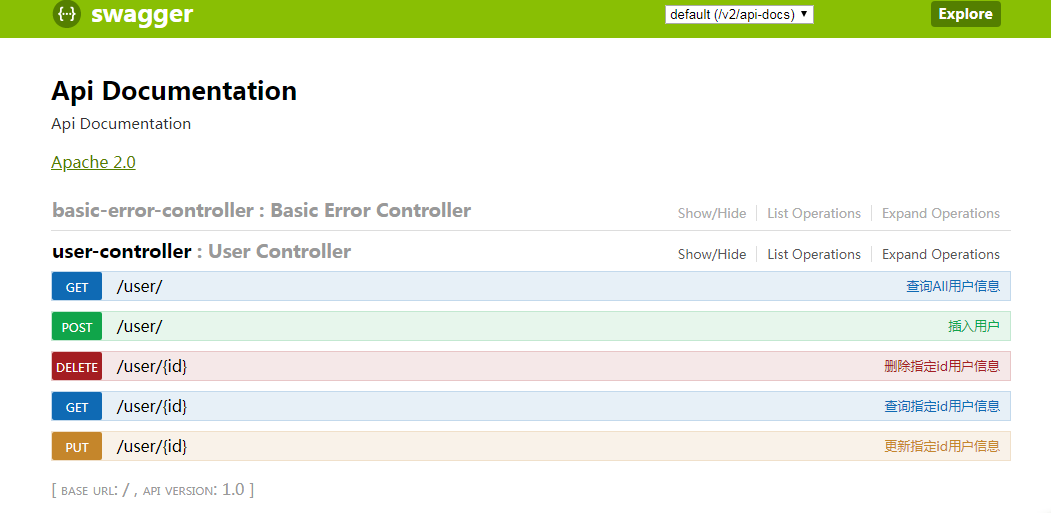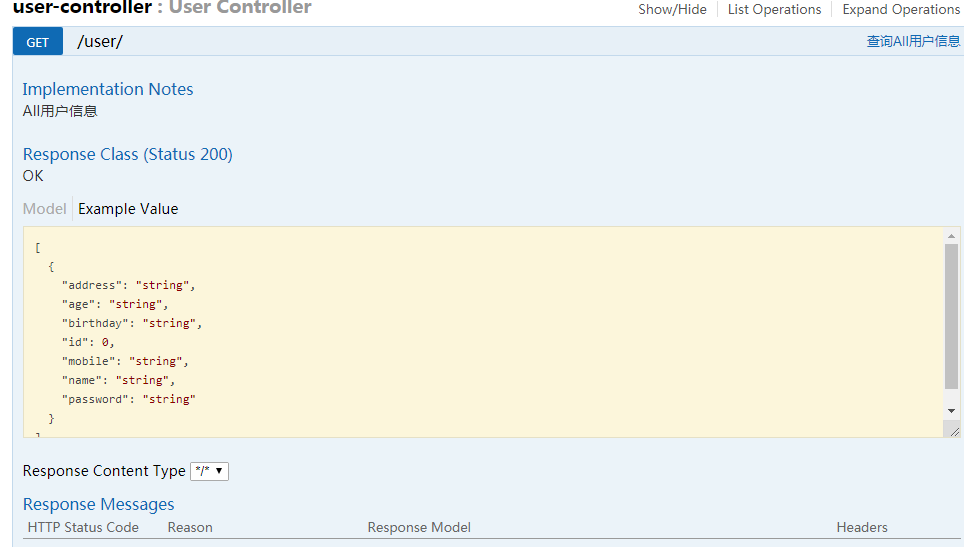后端开发中经常需要对移动客户端提供RESTful API接口,在后期版本快速迭代的过程中,修改接口实现的时候都必须同步修改接口文档,而文档与代码又处于两个不同的媒介,除非有严格的管理机制,不然很容易导致写出的代码与接口文档不一致现象。
Swagger 是一个规范和完整的框架,用于生成、描述、调用和可视化 RESTful 风格的 Web 服务。总体目标是使客户端和文件系统作为服务器以同样的速度来更新。文件的方法,参数和模型紧密集成到服务器端的代码,允许API来始终保持同步。


1.在pom.xml中加入swagger2依赖
<dependency>
<groupId>io.springfox</groupId>
<artifactId>springfox-swagger2</artifactId>
<version>2.2.2</version>
</dependency>
<dependency>
<groupId>io.springfox</groupId>
<artifactId>springfox-swagger-ui</artifactId>
<version>2.2.2</version>
</dependency>
2.创建swagger2配置类
@Configuration @EnableSwagger2 public class SwaggerConfig { @Bean public Docket createRestApi() { return new Docket(DocumentationType.SWAGGER_2) .apiInfo(apiInfo()) .select() .apis(RequestHandlerSelectors.basePackage("com.offcn.controller")) .paths(PathSelectors.any()) .build(); } private ApiInfo apiInfo() { return new ApiInfoBuilder() .title("Spring Boot中使用Swagger2构建RESTful APIs") .description("描述描述") .termsOfServiceUrl("http://www.baidu.com/") .contact("Sunny") .version("1.0") .build(); } }
3.Controller增加文档注释
通过@ApiImplicitParams@ApiImplicitParam注解来给参数增加说明
1 @RestController 2 @EnableConfigurationProperties({User.class}) 3 @RequestMapping("/user") 4 public class UserController { 5 6 @Autowired 7 User user; 8 9 private List<User> listUser= Collections.synchronizedList(new ArrayList<User>()); 10 11 //查询所有 12 @GetMapping("/") 13 @ApiOperation(value="查询All用户信息", notes="All用户信息") 14 public List<User> getAllUser(){ 15 return listUser; 16 } 17 //获取指定id的user 18 @GetMapping("/{id}") 19 @ApiOperation(value="查询指定id用户信息", notes="根据id查用户信息") 20 @ApiImplicitParam(name = "id", value = "用户ID", required = true, dataType = "Long") 21 public User getUser(@PathVariable("id") Long id){ 22 for(User u:listUser){ 23 if(u.getId()==id){ 24 return user; 25 } 26 } 27 return null; 28 } 29 //插入 30 @PostMapping("/") 31 @ApiOperation(value="插入用户", notes="插入用户信息") 32 @ApiImplicitParam(name = "user", value = "用户详细实体user", required = true, dataType = "User") 33 public String insert(User user){ 34 listUser.add(user); 35 return "success"; 36 } 37 //根据id修改 38 @PutMapping("/{id}") 39 @ApiOperation(value="更新指定id用户信息", notes="根据id更新用户信息") 40 @ApiImplicitParams({ 41 @ApiImplicitParam(name = "id", value = "用户ID", required = true, dataType = "Long"), 42 @ApiImplicitParam(name = "user", value = "用户详细实体user", required = true, dataType = "User") 43 }) 44 public String update(@PathVariable("id") Long id,User user){ 45 for (User user2 : listUser) { 46 if(user2.getId()==id) { 47 user2.setName(user.getName()); 48 user2.setAge(user.getAge()); 49 } 50 } 51 return "success"; 52 } 53 //根据id删除 54 @DeleteMapping("/{id}") 55 @ApiOperation(value="删除指定id用户信息", notes="根据id删除用户信息") 56 @ApiImplicitParam(name = "id", value = "用户id", required = true, dataType = "Long") 57 public String delete(@PathVariable("id") Long id){ 58 listUser.remove(getUser(id)); 59 return "success"; 60 } 61 62 }
4.启动tomcat:
访问地址:http://localhost:8080/swagger-ui.html
即可看到上面的API